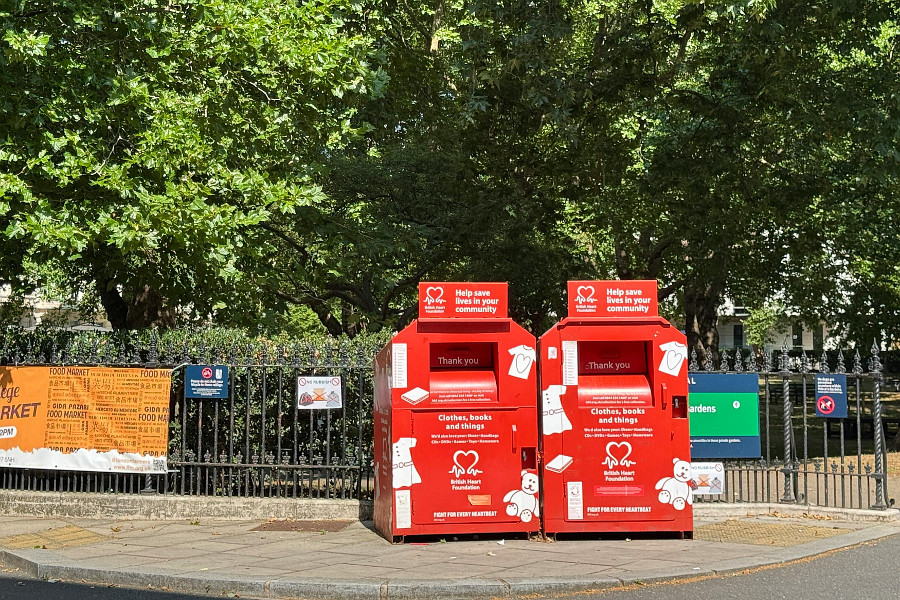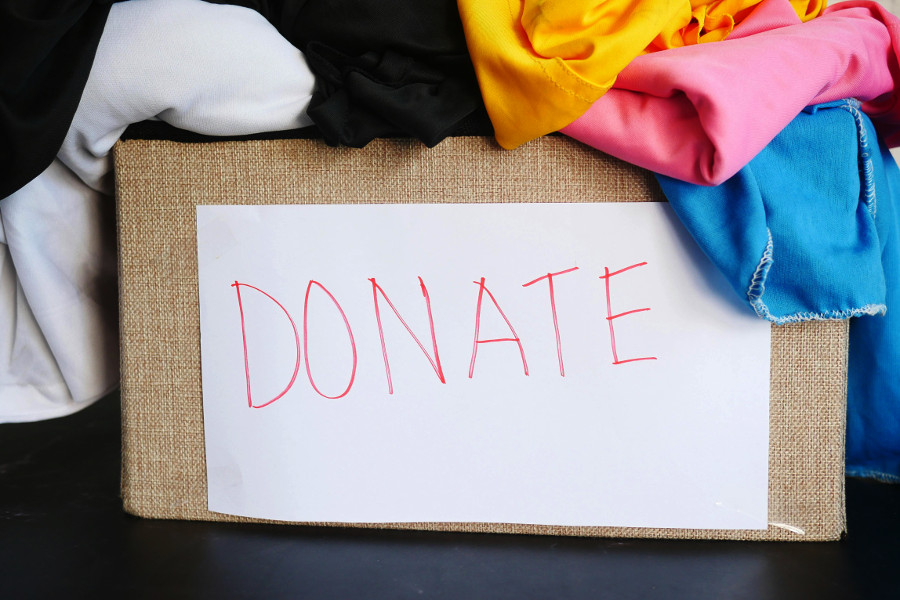From Clutter to Charity: Where and How to Donate Items You No Longer Need
Donating your unwanted items is a fantastic way to clear your space while giving back to your community. It’s about much more than just getting rid of things. It’s an opportunity to declutter with purpose, making a positive impact on both your life and the lives of others. And, in the process, you can create a more mindful, less chaotic environment. So, how do you go about it? Here’s a simple guide to donating what you no longer need.

Why Donate Instead of Throwing Things Away?
It’s easy to just throw things away - after all, that’s what the trash can is for, right? But when you pause for a moment and think about it, you’ll realize that throwing things away isn’t always the best option. The benefits of donating go far beyond just making space in your home.
The Environmental Impact
Every time we toss something in the trash, we’re contributing to the growing piles of waste that fill our landfills. But donating instead of discarding helps combat this problem. By passing on your unwanted items, you’re helping to keep them out of landfills, giving them a second life, and reducing the demand for new products. It’s a small act that, collectively, makes a big difference.
The Social Impact
Donating is one of the easiest ways to make a tangible difference in someone else’s life. Shelters, food banks, and other organizations rely on donations to help those in need. When you give away your unused items, you’re directly contributing to a more equitable society, helping families, individuals, and communities thrive.
The Personal Benefits
Decluttering isn’t just a practical task; it’s an emotional one, too. Letting go of things can feel liberating. And donating your items gives the process meaning. Instead of feeling overwhelmed by the clutter, you get to feel the satisfaction of knowing that your things are going to someone who truly needs them.
Assessing What to Donate: Items You Can Let Go Of
So, what do you get rid of? The hardest part of decluttering is deciding what to keep and what to let go of. Here’s a simple guide to what makes the most sense to donate:
Clothing
When was the last time you wore that shirt you’re holding onto? If it’s been months - or even years - chances are you’re never going to wear it again. The good news? Gently used clothing is always in demand, whether it’s at a local shelter or a thrift store. Shoes, scarves, and accessories can also be donated, as long as they’re still in good condition.
Books and Media
Books are one of those items that often end up collecting dust. But did you know they can be incredibly valuable to others? Donating your books gives them a second life in someone else’s hands. Similarly, old CDs, DVDs, and even tech items like phones and cameras can be donated to organizations or recycled responsibly.
Furniture and Household Items
Furniture might seem like one of the harder things to part with, but if it no longer serves a purpose, it’s time to pass it on. Whether it’s a comfy chair, a table you don’t use, or a lamp that no longer matches your décor, someone out there will gladly take it off your hands. And don’t forget those extra kitchen gadgets you never use - somebody else could be thrilled to get them.
Toys and Baby Items
If your kids have outgrown their toys or if you’ve held onto old baby clothes or strollers, now is the time to donate them. Items like these are always in high demand at shelters, daycare centers, and community programs that support young families.
Specialty Items
Some things might not be used often, but they still have value. Old sports equipment, out-of-date electronics, or even expired cosmetics might be the types of items you’d never think of donating - but trust me, others will appreciate them.

Where to Donate: Options Near You
Now that you’ve sorted through your stuff, it’s time to figure out where to donate it. The good news is that there are plenty of options to help you get your items into the right hands.
Local Charities and Shelters
You don’t have to look far to find a charity in need. The Salvation Army, Goodwill, and Habitat for Humanity are just a few examples of organizations that accept donations of clothing, furniture, and household goods. Local shelters are also always looking for donations, particularly for clothing, toiletries, and food.
Online Platforms for Donations
If you’d rather donate to someone nearby or even just give things away for free, consider using platforms like Facebook Marketplace, The Freecycle Network, or Nextdoor. These community-based sites allow you to post items for free, which people can come pick up at their convenience. It's a fast and simple way to give back, especially if you have larger items like furniture or appliances.
Nonprofits and Specialized Charities
Not all donations are general. Some charities focus on specific items, like Dress for Success, which accepts professional clothing for women entering the workforce. Some nonprofit organizations will also take items like books or electronics, which can be donated to groups focused on education, technology, or sustainability.
Schools and Libraries
Books are an easy and valuable donation, especially to local schools or libraries. If you have children’s books or educational materials collecting dust, they can be passed along to places that will put them to good use. Libraries also appreciate books in any condition, as they often hold book sales or simply give away donations to those in need.
Religious Organizations
Your local church, temple, or mosque may have outreach programs that could benefit from your donations. Many religious groups organize drives to collect clothing, food, or household goods for the needy, and they’re often looking for items to support their community programs.
Animal Shelters
If you have old towels, blankets, or pet supplies you no longer need, consider donating them to a local animal shelter. They’re often in need of these items to help care for the animals in their care.
Recycling Centers and E-Waste
For electronics that are broken or no longer useful, e-waste recycling centers are your best bet. These centers will safely dispose of or recycle electronic devices, ensuring that they don’t end up in a landfill.

How to Prepare Your Items for Donation
Getting your items ready to donate is key to making the process smooth. Here are a few tips to help:
Sorting and Organizing
Start by sorting everything into categories - clothing, books, toys, furniture, etc. This not only helps you stay organized, but it also makes it easier for the charity to process the donations.
Cleaning and Repairing Items
While you don’t need to restore everything to brand new, it’s always a good idea to clean your items before donating them. If an item is easily fixable - like sewing on a button or tightening a loose leg on a chair - take a few extra minutes to repair it. It’ll be appreciated.
Packaging for Transport
Use bags or boxes to group items together. Label each box with what’s inside (e.g., “Clothes - Women’s Medium” or “Books”). This will help both you and the donation center when it comes time to drop them off.
Taking Inventory
It’s smart to keep track of what you’ve donated, especially if you’re planning to claim a tax deduction. Many organizations will provide a receipt, which is helpful if you plan to write off your donations at tax time.
What to Do If You Can’t Donate?
Not everything is suitable for donation. If that’s the case, there are still ways to keep your stuff out of the landfill.
Consider Selling
Some items might have value, and selling them is a great option. Platforms like eBay, Poshmark, or Facebook Marketplace are perfect for selling gently used clothing, furniture, or electronics.
Repurposing or Upcycling
If you’re feeling creative, consider repurposing items instead of donating them. An old sweater can become a pillow cover, or glass jars can be used for storage.
Recycling
For things that can’t be reused, check out local recycling centers. E-waste recycling or municipal programs can ensure your unwanted items are disposed of responsibly.
Things to Consider Before Donating
Before you head out to donate, keep these things in mind:
Item Condition
Only donate items that are in usable, good condition. If it’s broken or too worn out, it’s better to recycle it.
Donation Policies
Different charities have different guidelines. Some only accept certain types of donations, so it’s a good idea to check their websites or call ahead.
Tax Considerations
If you’re donating for tax benefits, keep receipts and document the items you’re giving away. This can help you when it’s time to file your taxes.
Conclusion
Donating your unwanted items isn’t just about decluttering - it’s about giving back and making a difference. By choosing to donate, you’re clearing space in your home while also helping others in need. And the best part? It’s a win-win situation for everyone involved. So, take a few minutes, sort through your stuff, and consider donating - it’s one of the easiest ways to make a positive impact on your life and the world around you.



